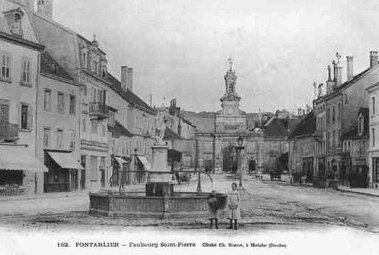The winter of 1916-1917 had also proved
unpleasant, prompting Anson to write to Redmond
“I hope you are not frozen stiff up at Pontarlier: It must be very beastly up
there now, you have my heartfelt sympathy”.
Throughout 1917 Redmond
continued to promote his position; frequently writing to his superiors about
the benefits of his base in Pontarlier, which included being able to offer the
safety and sanctuary of an allied country, as well as the ease with which he
could instruct agents coming from England.
As well as the agents coming from England, Redmond inherited a network of agents which he ran whilst in Switzerland. He maintained a list of 20 or so agents, some of whom had their own sub-agents who worked for them. This list was fluid, with new agents being added and others being removed. They were mostly recruited in LondonSwitzerland, although two, known as Pastor and Alfonso, came from Spain. The Spanish experiment wasn’t a success: Pastor was dismissed in January 1917 with the note “Has been absolutely useless.” Alfonso was little better – he found it very difficult to get a visa for Germany and was forced to wait in Berne for a long time.

Faubourg St Pierre, Pontarlier - A view which would be familiar to Redmond
Not all agents were poor: the agents
code-named Mary, Walfisch and Juliette were much better. Mary sent in excellent
C.E. reports and recruited agents for M.I. work in Germany. Walfisch’s C.E. work was
described as “very useful” and he was “instrumental with Mary in getting
several enemy agents notably “Joselet” arrested.”
Redmond noted that Juliette “Has done good work in obtaining M.I. in
districts around Delmont Basle etc. Also C.E. and contraband. Has several
agents in
The arrest of enemy agents in Switzerland was, of course, hugely important,
but throughout the Great War British intelligence constantly tried to recruit
and send agents to Germany.
Their intelligence was enormously important: The Western Front was, for long
periods of time, relatively static, with troop movements from one part of the
front to another indicating where the next offensive might come. For this
reason, the watching of troop trains was of great significance to gauge their
movements. From Pontarlier, Redmond gave
detailed instructions for agents going to Germany. These ranged from the
identification and recording of troop movements, through the composition of
German army units, to lists of specific information that was needed. Throughout
his papers the importance of careful and correct observation of troop trains
was constantly stressed.
Redmond also had to instruct agents in how to avoid detection – this applied as much to agents in Switzerland as those going to Germany: some of his advice may seem obvious, and even slightly comical – “Never confide in Women” or “Never give your photo to anyone, especially a female” (14) – but, especially when considering the newness of the Secret Service, some still seems relevant and will be familiar to anyone who has watched spy movies – to escape when being followed “get on a tram and, as soon as the agent gets on, get off yourself.”
Counter Espionage (C.E.) was an important part of Redmond’s work in Switzerland. Its objects were “(1) To discover German agents in Switzerland, - active, passive, and recruiters. (2) To fight by all possible means the German organisations”. Redmond divided C.E. into “active” and “passive”. Active C.E. had as its objective “the extermination of the German organisation” by gathering proof against suspects, then luring them into France where they could be arrested. Alternatively they could be arrested by the Swiss authorities.
Passive C.E. was largely indirect information gathering, such as getting information on people applying for visas and passports. As mentioned above, this C.E. work was successful, with some 20 or 30 enemy agents being arrested by the end of 1917.
Redmond was a character who was not easily satisfied: by December 1917 he was expressing his disappointment with the direction C.E. work was going – he felt it had been “subordinated to use for passport work and enquiries from London and G.H.Q.” (15) To counter this Redmond proposed a “Militant” C.E. Branch – Col. Dansey held the view that the first C.E. role was to protect our own agents – Redmond proposed to do this by going on the offensive: infiltrating the enemy organisation and then destroying the organisation. Redmond also wanted to use his militant C.E. organisation to stem the flow of German agents across the Swiss border into France by setting up a network of allied agents in the main frontier towns.
Redmond continued his work through the spring of 1918, but on 21st April, Commander Myres wrote to him with orders to proceed to the British Legation, Athens, via Rome, as Officer in charge of C.E. enquiries.